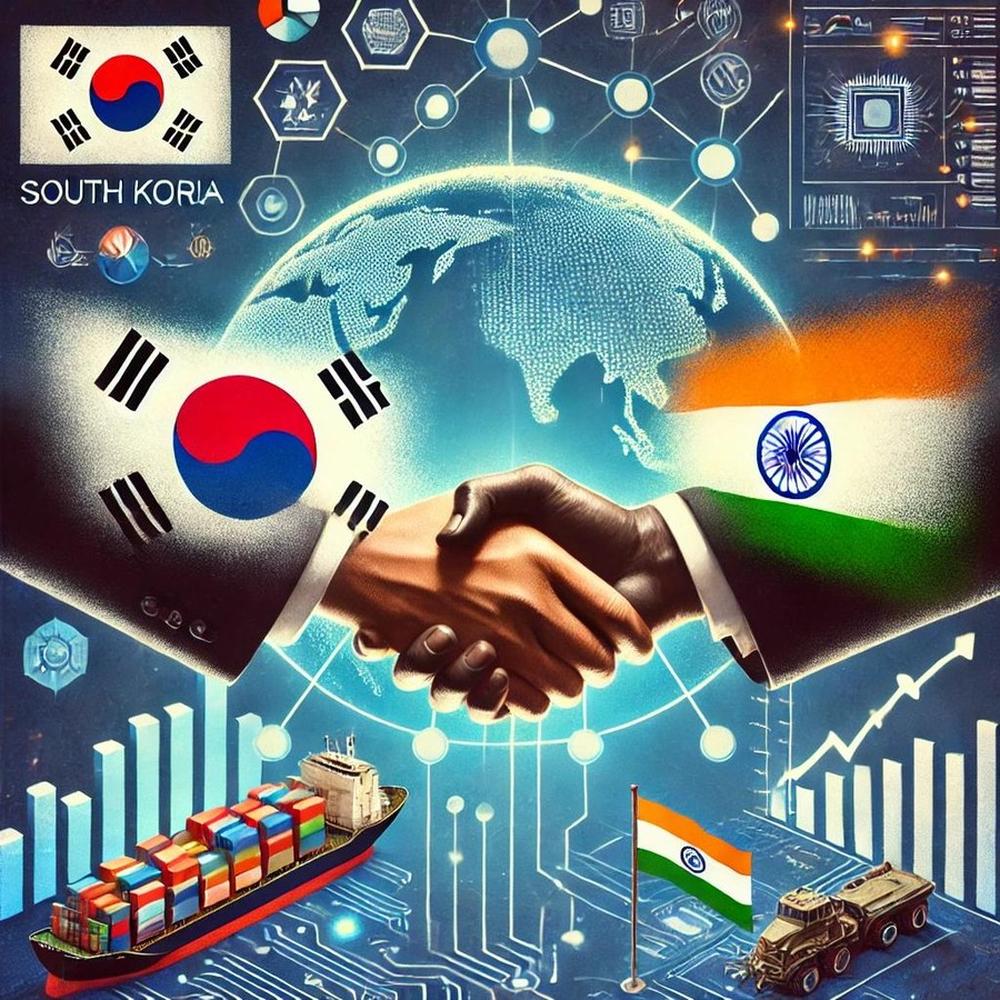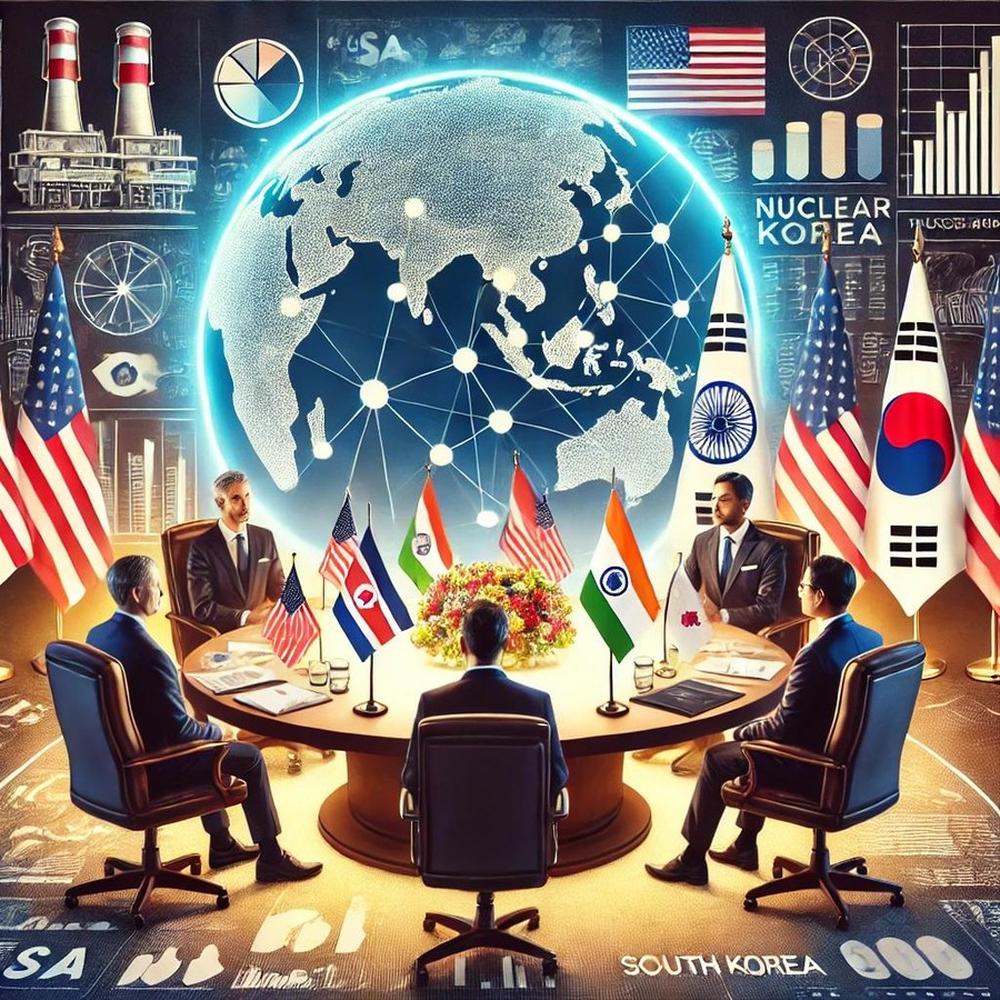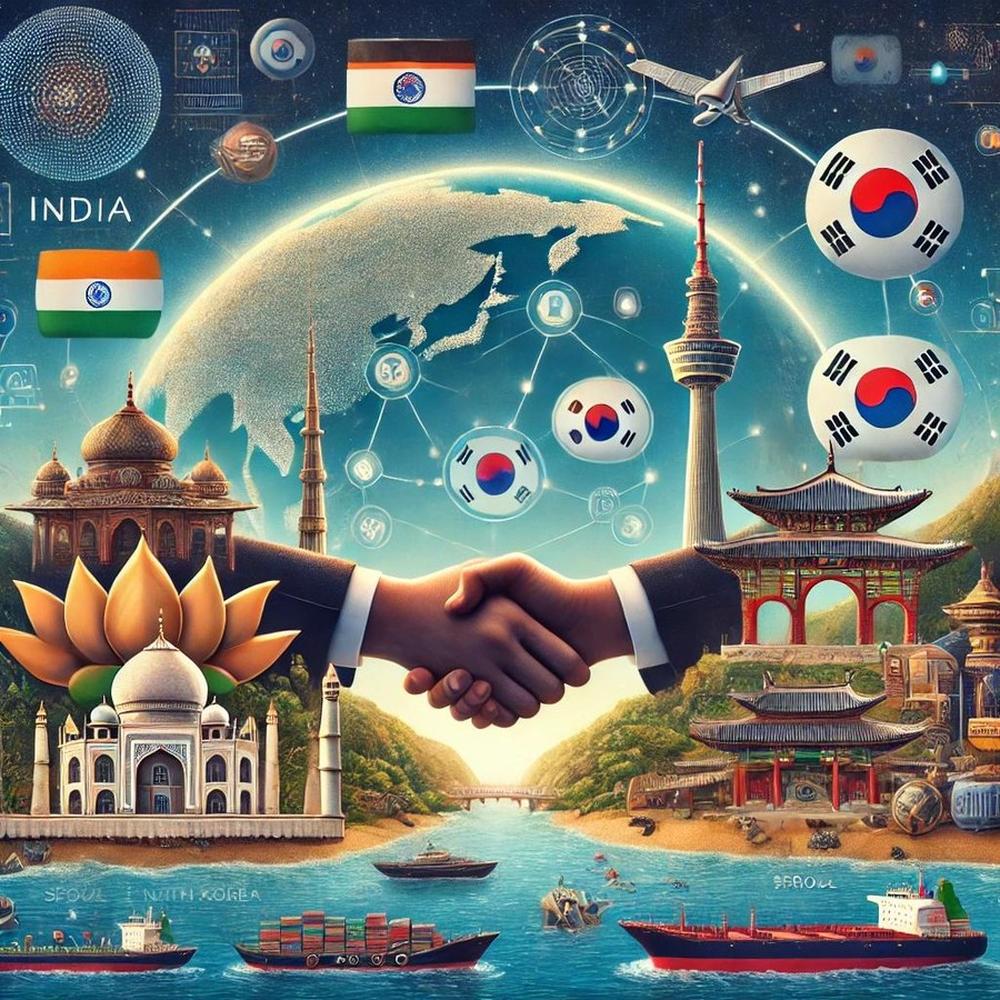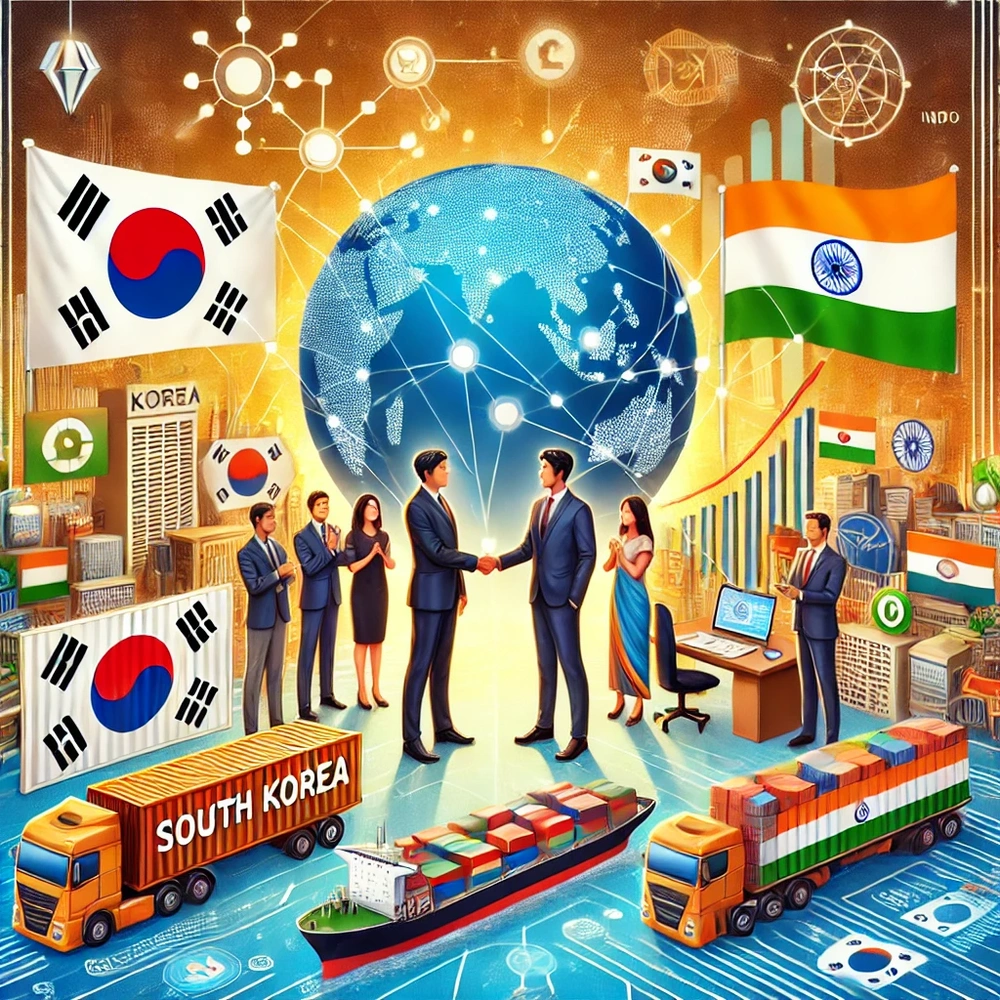- #Economy & Trade
- #US Foreign Policy

▶ Despite 50 years of diplomatic ties, Korea-India relations remain underdeveloped in areas like trade, defense, and technology, with bilateral trade volumes significantly lower than their economic capabilities suggest.
▶ A renewed Trump presidency could create opportunities and challenges for Korea-India relations, particularly in defense collaboration, economic realignment, and multilateral engagement, as both nations navigate shifting geopolitical dynamics in the Indo-Pacific.
▶ To achieve their full potential as strategic partners, Korea and India must modernize trade agreements, deepen defense cooperation, foster technology partnerships, and enhance cultural exchanges while jointly addressing global challenges in multilateral forums.
The year 2023 marked a milestone in Korea-India relations, commemorating 50 years of diplomatic ties between two nations now designated as "special strategic partners." However, despite the symbolic strength of this partnership, the relationship is not as robust as it could be. Trade volumes remain modest, strategic agreements like the Comprehensive Economic Partnership Agreement (CEPA) have seen little progress, and bilateral cooperation in areas like defense and technology is still emerging. Yet, there is growing momentum, with increasing cultural exchanges, direct investments, and collaborative projects in advanced industries.
The scheduled return of Donald Trump to the U.S. presidency in 2025 could introduce new geopolitical dynamics that might reshape Korea-India relations. Trump's "America First" policies, transactional diplomacy, and emphasis on bilateralism present both opportunities and challenges for these two Indo-Pacific nations. This article explores the current state of Korea-India relations, the potential impact of a Trump administration, and the strategies necessary for the partnership to achieve its full potential.
The Current Status of Korea-India Relations
Economic Relations: An Untapped Potential
Economic cooperation between South Korea and India remains underwhelming relative to their capabilities. Bilateral trade hovers around $27–30 billion annually, a figure that pales in comparison to India’s trade with China (over $120 billion) or South Korea’s trade with the United States and China (each exceeding $200 billion). Given the size and economic diversity of both nations, this volume is strikingly low.
The Comprehensive Economic Partnership Agreement (CEPA), signed in 2010, was expected to catalyze bilateral trade. Yet, negotiations to upgrade it have stalled for over a decade, hindered by differences over tariffs and market access. Indian tariffs on Korean automotive and electronics goods remain high, while South Korea's agricultural market remains relatively closed. These barriers continue to limit trade growth and deter investment in key sectors.
However, signs of progress are emerging. A growing number of South Korean companies, such as Hyundai, Samsung, and LG, have established a significant presence in India. Meanwhile, India’s "Make in India" initiative is drawing interest from Korean firms looking to diversify their manufacturing bases amid global supply chain disruptions. Direct investments in areas like consumer electronics, renewable energy, and semiconductors are poised to strengthen economic ties.
Defense and Strategic Cooperation
Defense cooperation has become a promising pillar of Korea-India relations. South Korea has supplied India with state-of-the-art defense equipment, including the K9 Vajra-T self-propelled artillery systems. Both nations have also engaged in joint military exercises, signaling a shared commitment to regional security. India’s Act East Policy and South Korea’s Indo-Pacific strategy align well, creating a foundation for enhanced strategic cooperation. With India seeking to modernize its defense capabilities and reduce dependence on traditional suppliers like Russia, South Korea’s advanced defense technologies offer significant opportunities for collaboration.
Technological and Industrial Collaboration
In an era of rapid technological advancements, South Korea and India are well-positioned to complement each other’s strengths. South Korea’s global leadership in semiconductor manufacturing and India’s emerging expertise in chip design and IT services present immense potential for collaboration. This partnership could be instrumental in addressing global semiconductor shortages and diversifying critical supply chains.
Beyond semiconductors, areas like artificial intelligence, renewable energy, and digital infrastructure also offer fertile ground for cooperation. India’s push toward self-reliance in high-tech industries under the Atmanirbhar Bharat(Self-Reliant India) initiative aligns well with South Korea’s industrial capabilities.
Cooperation between the two countries in the field of shipbuilding and nuclear energy also has great potential for development.
Cultural and People-to-People Exchanges
Cultural exchanges between South Korea and India have grown rapidly in recent years. The global popularity of Korean entertainment, from K-pop to K-dramas, has found a receptive audience in India. Conversely, Indian films, yoga, and cuisine are gaining traction in South Korea. The number of Indian students in South Korean universities and Korean expatriates in India is steadily increasing, fostering deeper mutual understanding.
The Potential Impact of the return of Trump Administration
If Donald Trump were to return to the U.S. presidency, his distinctive approach to geopolitics could significantly influence the trajectory of Korea-India relations. Trump’s "America First" policies prioritize bilateral deals, reduce reliance on multilateral institutions, and adopt a transactional approach to alliances. For Korea and India, this could create both opportunities and challenges.
1. Geopolitical Dynamics in the Indo-Pacific
The Indo-Pacific region is central to both South Korea and India’s strategic interests. Under the previous Trump administration, the Indo-Pacific Strategy gained prominence, emphasizing the importance of countering China’s growing influence. Trump’s support for the Quad (a strategic alliance between the U.S., India, Japan, and Australia) underscored India’s pivotal role in regional security.
South Korea, although not a member of the Quad, has a vested interest in maintaining a stable and secure Indo-Pacific. A renewed Trump administration might encourage South Korea to align more closely with U.S.-led initiatives, creating opportunities for Korea-India cooperation in maritime security, infrastructure development, and counter-terrorism.
2. Defense Collaboration
Trump’s emphasis on reducing U.S. military commitments overseas could push regional allies like South Korea and India to take greater responsibility for their own security. This scenario would likely accelerate defense cooperation between the two nations. India’s growing demand for advanced military technologies aligns well with South Korea’s expertise in defense manufacturing, from naval vessels to missile systems. Additionally, Trump’s transactional approach to arms sales might open new avenues for Korea-India defense deals, including joint ventures and co-production initiatives.
3. Economic Realignments
Trump’s trade policies, characterized by tariffs and a focus on reducing trade deficits, could prompt South Korea and India to strengthen their bilateral trade and investment ties as a hedge against U.S. unpredictability. For instance, India’s focus on building a semiconductor ecosystem under its "Make in India" initiative could benefit from South Korean expertise, particularly in chip fabrication.
Furthermore, if Trump’s policies disrupt global supply chains, South Korea and India could collaborate to establish more resilient and diversified trade networks. This includes exploring partnerships in emerging sectors such as electric vehicles, hydrogen energy, and green technologies.
4. Multilateral Engagement
The Trump administration’s skepticism toward multilateral institutions like the United Nations and World Trade Organization could reduce U.S. influence in global governance. In this context, Korea and India could take on greater leadership roles in promoting multilateralism and rules-based international order. Their cooperation in forums like the G20 and ASEAN could address pressing global issues, from climate change to digital governance.
Strategies for Deepening Korea-India Relations
To unlock the full potential of their partnership, Korea and India must take proactive steps to address existing challenges and seize emerging opportunities.
1. Modernizing CEPA
Upgrading the CEPA should be a top priority. Both nations need to address tariff and non-tariff barriers that hinder trade. For instance, India could lower tariffs on South Korean electronics and automotive goods, while South Korea could open its agricultural market to Indian exports. A modernized CEPA should also include provisions for digital trade, intellectual property rights, and services.
2. Expanding Defense Collaboration
Defense ties should be deepened through joint production, technology transfer, and research collaborations. Projects such as building next-generation fighter jets, advanced naval vessels, and missile systems could significantly enhance strategic cooperation. Additionally, regular joint military exercises and intelligence sharing would strengthen mutual trust.
3. Strengthening Technology Partnerships
A comprehensive technology partnership should focus on semiconductors, artificial intelligence, renewable energy, shipbuilding and space exploration. South Korea’s industrial expertise and India’s burgeoning tech talent can create a formidable alliance in driving innovation and addressing global challenges.
4. Enhancing Cultural and Educational Exchanges
People-to-people ties are the bedrock of long-term relationships. Initiatives like increasing scholarships for Indian students in South Korea, promoting Korean language education in India, and supporting cultural festivals can foster deeper connections. Such efforts will help build a robust cultural bridge between the two societies.
5. Collaborating on Global Issues
Korea and India should work together in multilateral forums to address shared global challenges. Whether it’s advocating for climate action, reforming global trade rules, or shaping digital governance frameworks, their joint efforts can amplify their influence on the world stage.
Conclusion: A Partnership for the Future
As South Korea and India enter the next phase of their relationship, the potential for deeper and more strategic cooperation is immense. While challenges persist, from stalled trade negotiations to differing foreign policy priorities, the opportunities far outweigh the obstacles. The return of Donald Trump to the U.S. presidency adds a layer of complexity to the global landscape, but it also underscores the need for Korea and India to strengthen their bilateral ties.
By revitalizing economic engagement, expanding defense collaboration, and leveraging their complementary strengths, Korea and India can build a partnership that is not only resilient but also transformative. Such a relationship would not only benefit their own nations but also contribute to regional and global stability in an increasingly uncertain world. The next decade presents an opportunity for Korea and India to turn potential into reality, cementing their status as true strategic partners.//
Ambassador Joongyu Lee is the President of the Forum of India in Korea. He had served for almost 40 years as a career diplomat until 23 December 2017 when he officially retired. He had served in Delhi during 2012-15 as an Ambassador. He also served in Japan and New Zealand as Ambssadors. He completed his Bachelors and Masters in Law from Seoul National University in 1976 and 1978 respectively. Before he went to India as an Ambassador, he was Chancellor of the IFANS which is a training and research arm of Ministry of Foreign Affairs. Since his retirement from public service, he has been trying hard to contribute to betterment of Korea’s relationship with friend countries such as India and Japan in various ways. He has been a Vice President of the Korea-Japan Friendship Association since 2019. He was an elected Chairman of the Korean Council on Foreign Relations from January 2020 to December 2022. He was a Chairman of the Asan Institute for Policy Studies from March 2022 to February 2023.


